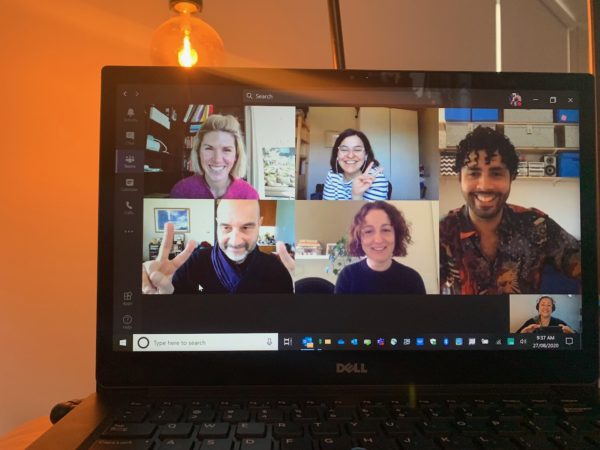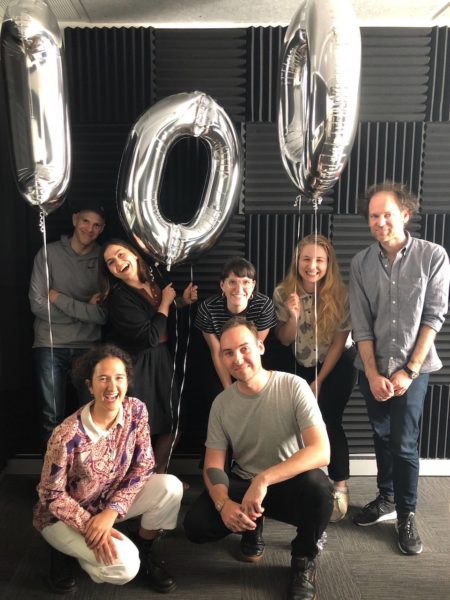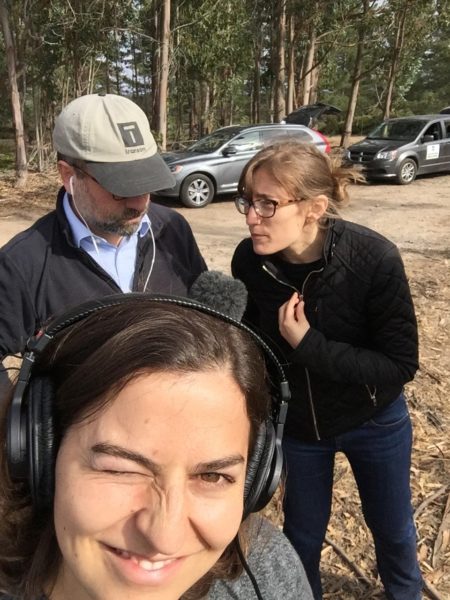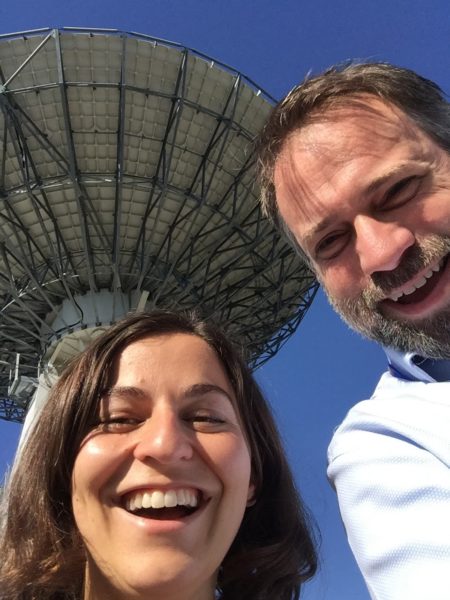What piece of audio has had the most profound effect on you – as a listener, as an audio maker or both?
Early This American Life: it’s a total cliche but there it is. Also, when the first season of Start Up came out, it sounded like nothing I’d heard before and I remember being so excited and dying for the next episode, the same way I later felt about S-Town.
But really, my answer to this changes all the time. It’s any piece that you’re still thinking about a while after you’re done listening. Lately for me that’s been this Reply All piece by Emmanuel Dzotsi. I’ve recently revisited ‘Five Women’ by Chana Joffe-Walt, this Hidden Brain episode, and this beautiful piece by Jaye Kranz, because they’re all so brilliant. I was also really moved by this series from UK outlet Tortoise, about the fight for journalistic freedom in Malta, and PJ Vogt’s latest, ‘Country of Liars‘.
Where do you work? And what tools help you the most?
My partner dreamt up the best WFH recording solution that I think will be with me for life.
At the moment, from the depths of Melbourne’s lockdown, I’m working on a brand new ABC podcast called Days Like These at home, in the spare room of my apartment. My partner dreamt up the best WFH recording solution that I think will be with me for life now: I bought some moving blankets from Bunnings and have jerry rigged them to the doors of my wardrobe with these spring clamps, so they form a kind of curtain on three sides. I’ve squeezed a little seat in there and sort of shimmy in to do all my recording. It’s not a beautiful set up to look at but once you’re in there it’s dim, quiet and it deadens the sound remarkably well. We’ve recorded the whole first season of Days Like These in there.

Where did the idea for your new podcast, Days Like These, come from?
The idea for Days Like These initially formed as a response to the way a lot of people were feeling in the early days of the pandemic. The idea was to create a show that is basically all about story, with each episode covering the biggest story in one person’s life, as told by them.
The first season is filled with some incredible people telling their stories: some are all joy, surprise and delight, others include these big challenges a person may have faced, but it’s mixed in with lots of humour. For a story to get up on the show, it has to be engaging, funny, and very human, especially at a time when most people are after a bit of escapism from constant news headlines and case numbers. There’s a big love story, a few really incredible adventure stories, a near death experience. I can’t wait for it to be out in the world and for people to hear it and tell us what they think! The first episode launches 14 October, and new episodes are released each Wednesday.
The show is also a little sister to Conversations, where sometimes stories come up that might not sustain over the 50 minute episodes of that show, but have a lot of narrative drive. So those stories can end up working really well on Days Like These as shorter, punchier episodes of about 20 minutes.
What is your favourite part of making Days Like These?
Talking to people. And then, once I have the tape of our interview, getting to sit with their voice for hours, learning the cadence and subtleties of their way of speaking. It’s like a fingerprint, and I find it engrossing to sit with the tape like that while constructing a story. It could be a person’s turn of phrase, the different sounds a person makes when they’re thinking, piecing together a sentence in their head, the way they express surprise – those are my favourite bits.

How has working on Days Like These been different to producing and hosting 7am?
Days Like These isn’t a daily show, so there’s time for multiple drafts and edits of stories, which isn’t really possible on a daily deadline. So as a general rule, the Days Like These stories are more produced.
Probably the biggest difference is the nature of the stories: the vast majority of 7am episodes were interviews with journalists about print stories they’d already reported. Days Like These is really about talking to people about the biggest story of their own lives, and I’m one of a team of audio reporters. So the way you interview, the kind of tape you’re trying to generate, it’s completely different because you’re asking someone to explain part of their lived experience. It’s all first-hand stuff.
Do you think the work you make reflects your personality? If so – in which ways?
I guess so, yeah. Probably the most clear link is that the stories I’ve worked on over the last five years reflect many of the things I’m deeply interested in, and in some cases, are things I’ve been fascinated by since I was a kid.
When I was working at Planet Money, I spent the better part of a year travelling around the US to report on the new space industry. The show sent its own satellite to space, and I was there for the rocket launch, at an air force base in California (we had named the satellite ‘Pod-1’). It was one of the best days of my life. There’ve been stories about the former East Germany. About the postal service. And there’s one in the first season of Days Like These that I cannot wait to be released. It’s about another childhood fascination, but I’m not giving it away yet.
Has anything surprised you about the differences or similarities between the Australian and American audio landscapes?

In terms of how shows are made, there are two things that stick out to me. First, most US narrative audio shows will have an editor who works to make all the stories that show puts out better. They see the best version of a story before it’s been made, and are the show’s gut check. The people I most look up to and who I’ve had the pleasure of working with – who can do it so, so well – are Tim Howard and PJ Vogt, Stacey Vanek Smith and David Kestenbaum. I don’t know that all Australian shows have that role as a standard yet. It was something I was emphatic about when starting 7am.
The second thing is the insertion of the personal into audio reporting and scripting. In some cases, Australian audio makers aren’t as at ease with that as in the US.
In terms of the audio ‘market’, something that I knew but was still surprised about when I moved back to Australia was just the sheer difference in size, scope and depth in media in general. I hadn’t spent a great deal of time working in Australian media before I left for the US, so I wasn’t really prepared for the difference. There is the difference in audience size, sure, but then there’s the cultural power of American audio and podcasting, which still reaches so far beyond its domestic audience. So the resources available to shows, the potential audience size, and the opportunities for advertising and audience support are just of a different magnitude.

What – if anything – do you think distinguishes Australian audio? What would you like to hear more of?
Humour and our accents. I’m not really sure what Australian audio is becoming yet, but there’s no doubt there’s an amazing tradition to be drawn from. It’s probably a deeply unfashionable answer, but I would love to hear more news magazines and good 2–4 minute reported pieces on the radio in Australia. It generates amazing, informative work. But also, it’s an investment in the future of our audio makers.
So many of the greats working in long-form audio in the US today got their start by filing short reported pieces for the morning and evening shows on NPR. It’s the best training you can get. You have to condense a story right down, figure out an arc, and tell it with economy – you’ve got maybe 5 or 6 cuts of tape to work with. In the US, it’s possible to get that work as a freelancer, or as a junior producer. It’s an incredible tradition and it terrified me at first, but it was some of the best work experience I’ve ever got. Two of my all time favourite short radio pieces are Robert Smith on celebrating the life of James Brown, and Sean Cole on the incredible shrinking product.
What are you listening to at the moment?
If I’m working on a bunch of stories, there’s not always a tonne of listening time outside that. For the past few months, I’ve been listening to drafts of stories from the other reporters on Days Like These, too.
Outside of that, I’m currently catching up on Nice White Parents, 1619 and Debutante. I also recently finished Mike Williams’s ‘Backflip’ series, which aired last year on Life Matters. I had to stop and rewind so many parts of it, either because I was laughing my head off or because I was compelled to listen to parts of the writing again and again. I absolutely loved it. I’m a big fan of Mike’s work and loved the series he and Timothy Nicastri created, The Real Thing.
In terms of daily listening, I love listening to Sabra Lane on AM. At night, I brush my teeth listening to a livestream of Noel King on NPR’s Morning Edition. I love the top of the hour news feature on the homepage of the ABC listen app, because I always miss the headlines on the radio by a few minutes. When I need a pick me up, I listen to an episode of The Fitzroy Diaries. I’m on at least my third listen-through of both seasons.
Being a great producer is the best training for being a reporter/host.
What’s the best (or worst) advice you’ve received about radio or podcasting?
Being a great producer is the best training for being a reporter/host. Knowing how to work with tape, and knowing what’s possible, because you’ve cut endless hours of your own tape and you’ve cut it for others. It becomes a muscle memory. It’s obvious but not always true that sound should be the building block of a piece. Don’t rely too heavily on paper scripts.
Where else do you find influence or inspiration for your work?
Reading fiction and non-fiction. The economy of Normal People blew me away recently. I was completely invested in these characters in less than 50 pages. And also, amazing TV. Right now, that’s Lovecraft Country. Finally, the team I’m working with – which on Days Like These includes Patrick Abboud, Sam Wicks and Alex Lollback, who’ve brought so much creativity and thought to their work over this first season.
Elizabeth’s new podcast, Days Like These, is released on 14 October 2020, with episodes every Wednesday.